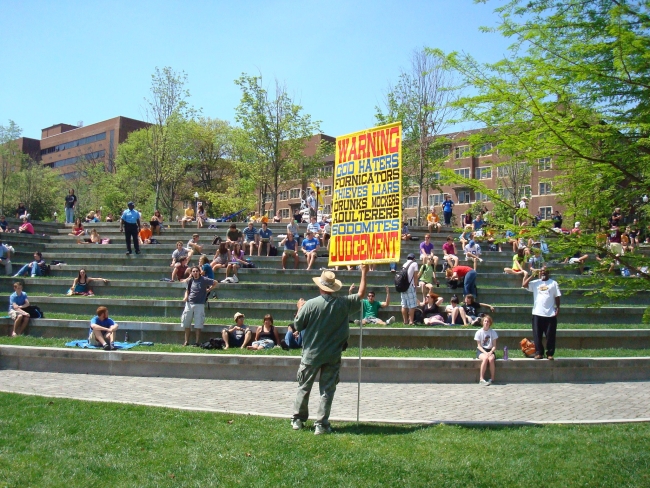You have /5 articles left.
Sign up for a free account or log in.

John McGlone preaching on campus
John McGlone Facebook page
A federal appeals court on Friday reinstated a lawsuit by an itinerant preacher against the University of Tennessee at Knoxville, finding that the university's policies appear to be unconstitutionally vague.
The ruling is the latest in a series of federal court opinions about how much leeway universities need to give to people unaffiliated with a public college or university who want to speak on campus. In several cases prompted by preachers who appear on campus, courts have ruled that college officials were too quick to deny them permission to speak.
John McGlone, the preacher in this case, sued after he was not permitted to speak at the university in 2010, even though he had done so several times before. He was referred by university officials, according to the court ruling, to two policies. One said that for someone without a university affiliation to speak would require the sponsorship of a student, faculty member or administrator. The other policy said that sponsorship needed to come from a recognized student organization.
A federal district court dismissed McGlone's suit, saying that the policies were sufficiently clear. But the U.S. Court of Appeals for the Sixth Circuit on Friday found that the differences between the two policies made them problematic, and therefore revived the litigation.
As evidence of the problem, the decision notes that McGlone was quoted different policies by different university administrators. "[T]he record establishes that people of ordinary intelligence -- university officials -- have applied the policy differently," the decision says.
While the policies might appear similar, they aren't, the decision says. A decision to rely on the policy requiring sponsorship by a registered student organization, the decision says, "would severely limit a potential speaker's sponsorship options considering that there were 395 registered student organizations and approximately 27,000 students." The appeals court adds that "vague laws create the danger of having a chilling effect on speech."
On his Facebook page, McGlone posted a reaction to the appeals court's ruling: "Praise Jesus the 6th Circuit Court has overturned the lower court ruling in my UT Knoxville case. It is still not completely finished yet, please pray that we would be able to get back in there this fall to reach out to the students there. Thanks."
The University of Tennessee did not respond to a request for comment on the decision.
A previous McGlone lawsuit against Tennessee Technological University has already forced changes in rules for visiting speakers there. The changes followed a ruling by the same federal appeals court last year finding that the university was asking too much when it required requests for speeches to be made at least 14 days in advance and to include details on the purpose of the appearance.
In other cases brought by visiting preachers, federal appeals courts have ruled that public institutions can’t assert blanket authority to bar speakers whose security costs aren't covered by student groups or some other entity, or set strict limits on the number of visits by a speaker. But appeals courts have upheld the requirement of some advance notice (such as three days, as was the case at the University of Arkansas at Fayetteville) as acceptable.








